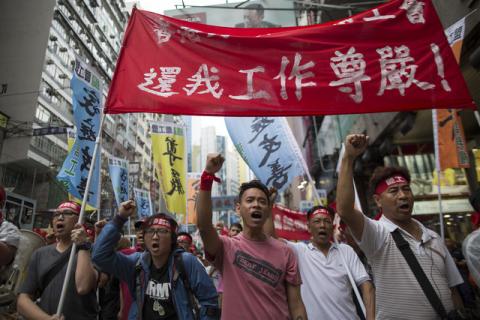Port workers at billionaire Li Ka- shing’s Hongkong International Terminals Ltd. ended the longest strike at Hong Kong’s container terminal as they accepted a 9.8 percent wage increase, resolving a dispute that damaged the city’s reputation as a trade hub.
The union will discuss arrangements for workers to return to the port, Chan Chiu-wai, organizer at the Union of Hong Kong Dockers, said by phone yesterday. Workers had earlier demanded a 23 percent gain, while employers offered a 7 percent increase.
The agreement ends the biggest labor action against Asia’s richest man, in which about 450 dock workers, crane operators and stevedores walked out on March 28 demanding higher wages. The 40-day strike at the world’s third-largest container port spurred shipping lines to divert vessels to nearby Chinese ports. Some dockers and their supporters pitched tents around Li’s Cheung Kong Center head office in the city center, and were barred from entering the building by court order.
“The weak bargaining power and poor work conditions revealed by the strike could deter young people from working in the industry,” said Geoffrey Cheng, an analyst at Bank of Communications Co. “It is time for the government to think about its role and what it can really do for Hong Kong, which is already under threat amid rising competition.”
The workers, hired by contractors, will get an increase in wages from HK$55 ($7.09) an hour. The docks were operating at about 90 percent of capacity in the last week of April after new employees were hired and some strikers returned to work.
‘Beneficial’ Resolution
“We are pleased to learn that the striking dockers have accepted the 9.8 percent pay rise solution for all job types offered by the external contractors,” Hongkong International Terminals said in an e-mailed statement yesterday. “This is beneficial for all parties involved: the workers can return to their posts and the company can focus on restoring the port to its full operational capabilities.”
Hongkong International Terminals is operated by Hutchison Port Holdings Trust (HPHT), whose largest shareholder is Li’s Hutchison Whampoa Ltd. (13) Hutchison Port, along with partner Cosco Pacific Ltd. (1199), dominates half of the capacity at Hong Kong’s port. Hutchison Whampoa has interests in 52 ports globally from Panama to the Netherlands.
Terminals controlled by Hutchison Port also have a 46 percent market share in Shenzhen, China, where shipping lines including Evergreen Marine Corp Taiwan Ltd. (2603) diverted vessels because of the strike in Hong Kong.
“It’s surprising that the strike lasted for such a long time, which damaged Li’s reputation,” said Lawrence Li, an analyst at UOB-Kay Hian Holdings Ltd. (UOBK) Still, the financial impact on the port operator is “insignificant,” he said.
Rising Costs
The dockers were demanding higher wages as rising living costs and record home prices spur discontent in the former British colony. Cathay Pacific Airways Ltd. (293), the city’s main carrier, in December agreed on a deal with the flight attendants’ union, averting labor disruptions threatened after disagreements on wage increases and working conditions.
As the strike lengthened, port workers had surrounded Li’s office building, Cheung Kong Center, in the Central business district. Hutchison Whampoa won a court injunction to have the workers, who earlier led marches with pictures of Li as a vampire, barred from the building. The workers were allowed to continue demonstrating outside the building.
The Labor Department will continue to follow up with Hongkong International Terminals and its contractors on improving safety and health conditions, Labor Secretary Matthew Cheung said in a statement yesterday, after workers agreed to accept the pay increase.
The bargaining power of workers, who say their wages are lower than in 1995, weakened in the past decade as Hong Kong lost market share to Chinese ports.
Boxes handled by Hong Kong port fell 5.2 percent to 23.1 million last year from 2011, according to Hong Kong Port Development Council data. Total volume at Shenzhen rose 1.6 percent to 22.9 million containers, according to Shenzhen Ports Association. Shanghai and Singapore are the world’s two biggest container ports.
Temporary Workers
Some workers were told last month they will lose their jobs as Global Stevedoring Service Co., one of the contractors who employs them, decided to wind up operations because it wasn’t able to meet the salary demands.
“HIT has proactively communicated with its external contractors and urged them to recruit ex-Global crane operators who have yet to finalize new employment arrangements,” Hongkong International Terminals said yesterday.
The port added temporary workers to help resume operation, and also offered more money to 300 crane operators who started a work-to-rule action on April 4 in support of the strike.
The daily financial loss caused by the strike was “significantly” cut in the last two weeks in April, Hongkong International said April 23, without elaboration. The daily loss narrowed to HK$2.4 million on April 5 from HK$5 million earlier, it said previously.
Li is boosting his dominance at Hong Kong port as Hutchison Port in March bought a box terminal from DP World Ltd. and a partner. The deal can happen because there is no antitrust law in Hong Kong, according to Ronny Tong, a lawmaker and a barrister specializing in commercial, shipping and company law.
After the deal, Hutchison Port’s share in the city’s port will be boosted to 64 percent of capacity, up from 55 percent, according to UOB-Kay Hian Holdings data. The city has nine container terminals.
To contact the editor responsible for this story: Anand Krishnamoorthy at anandk@bloomberg.net


Spread the word